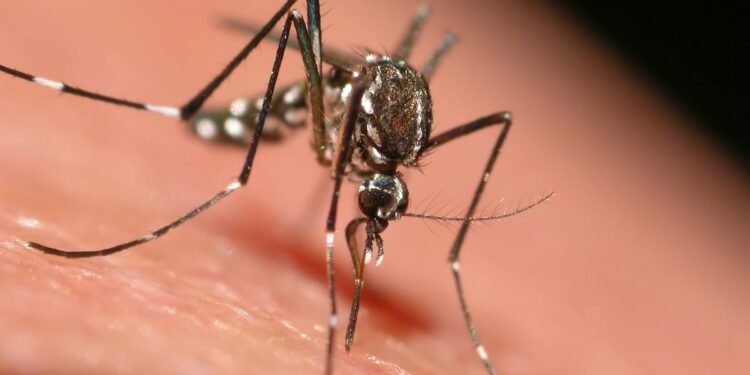More than a dozen Floridians who traveled to Cuba this year were infected with Oropouche, a virus known as “sloth fever” and spread mainly by tiny biting flies and some mosquitoes, state data shows.
Florida has recorded 30 Oropouche infections this year, and Miami-Dade County has the most confirmed cases. State health officials say all of the infections are considered to be associated with travel to Cuba, which is experiencing an Oropouche outbreak.
The U.S. Centers for Disease Control and Prevention has Cuba under a health travel notice, and is cautioning travelers to take enhanced precautions to reduce their risk of bug bites.
Ten of the infections were reported during the week of Aug. 18-24, just a few days after the CDC issued a health advisory, asking doctors to consider testing sick people who recently traveled to countries where the disease is known to be spreading.
Here’s what to know about Oropouche:
How do people get sick with Oropouche?
Oropouche is spread to people by the bite of infected “biting midges,” which are tiny biting flies that are sometimes called “no-see-ums,” though some mosquitoes can also spread the disease, according to the CDC.
While infected people can’t spread the disease to others, there is “limited data from Brazil” that suggests there’s a possible risk pregnant women can transfer the virus to their baby, and that the virus could lead to complications including stillbirths and birth defects, the CDC says.
Countries with an Oropouche outbreak
More than 8,000 confirmed cases of Oropouche have been reported this year from countries in the Americas, according to the World Health Organization. The virus, which is endemic to the Amazon and was identified nearly 70 years ago, has spread outside the region and has been linked to human deaths for the first time, according to Nature.
While most of the cases have been reported in Brazil, people have also been infected in Bolivia, Colombia, Peru and Cuba. The CDC has a travel health notice for South America and is asking travelers to take “usual precautions” to prevent bug bites and reduce risk of infection. Pregnant travelers should speak with their doctor about travel plans and precautions.
The federal public health agency has put Cuba under a travel health notice, and is asking travelers going to the island to take extra precautions to reduce their risk of infection. “Pregnant people should reconsider non-essential travel to Cuba.”
Where have Oropouche cases in Florida been reported?
Florida has confirmed 30 cases of Oropouche, or “sloth fever,” this year, and 14 of the cases were in Miami-Dade County, according to the state’s most recent mosquito surveillance report. That’s nearly half of the reported cases.
Other counties that have reported cases include Broward, Duval, Hillsborough, Lee, Orange, Palm Beach, Pasco, Polk and Sarasota.
Keep up with Tampa Bay’s top headlines
Subscribe to our free DayStarter newsletter
We’ll deliver the latest news and information you need to know every morning.
You’re all signed up!
Want more of our free, weekly newsletters in your inbox? Let’s get started.
Explore all your options
The Florida Department of Health says all of the cases were associated with travel to Cuba. The U.S. has also confirmed a case in New York that is associated with travel to Cuba.
Oropouche symptoms
Oropouche symptoms are similar to other mosquito-borne illnesses such as dengue, making it impossible to know if someone is infected with Oropouche unless they get tested.
Symptoms include fever, severe headache, nausea, vomiting, chills and muscle aches. Some people might also get a rash, pain behind the eyes and feel sensitivity to light, according to the CDC.
“Symptoms typically start 3-10 days after being bitten and last 3-6 days,” and most people recover, according to the agency. Some people can get seriously ill.
The CDC is recommending people who experience any of these symptoms during or within two weeks of travel to affected countries to “seek medical care immediately,” tell their doctor where they traveled and to take steps to prevent bug bites to reduce the risk of spreading the illness. Health officials say people should also avoid taking aspirin or other nonsteroidal anti-inflammatory drugs like ibuprofen to reduce the risk of bleeding.
Tips to reduce risk
There are no vaccines or medications to treat Oropouche. For people planning to travel to countries where Oropouche infections are occurring, health officials recommend taking steps to reduce the risk of bug bites. The tips are similar to how to reduce your risk of mosquito bites:
Use an Environmental Protection Agency-registered insect repellent that is labeled for flies, biting flies or Culicoides (biting midges, punkies, granny nippers, and no-see-ums). The repellents should contain DEET, IR3535 or icaridin, according to the Pan American Health Organization.Wear protective clothing, such as long-sleeved shirts, pants and socks.Protect your home or lodging with “fine mesh mosquito nets on doors and windows, as well as beds and furniture where people rest. … As midges are much smaller than mosquitoes, traditional mosquito nets will not protect against their bites,” according to the Pan American Health Organization.
©2024 Miami Herald. Visit miamiherald.com. Distributed by Tribune Content Agency LLC.
Source link : http://www.bing.com/news/apiclick.aspx?ref=FexRss&aid=&tid=66cfd9a2c3f647dfb60bc470110033a9&url=https%3A%2F%2Fwww.tampabay.com%2Fnews%2Fhealth%2F2024%2F08%2F28%2Fsloth-fever-oropouche-hillsborough-pasco-florida-mosquitoes-bug-bites%2F&c=15515165098478745105&mkt=en-us
Author :
Publish date : 2024-08-27 13:00:00
Copyright for syndicated content belongs to the linked Source.







